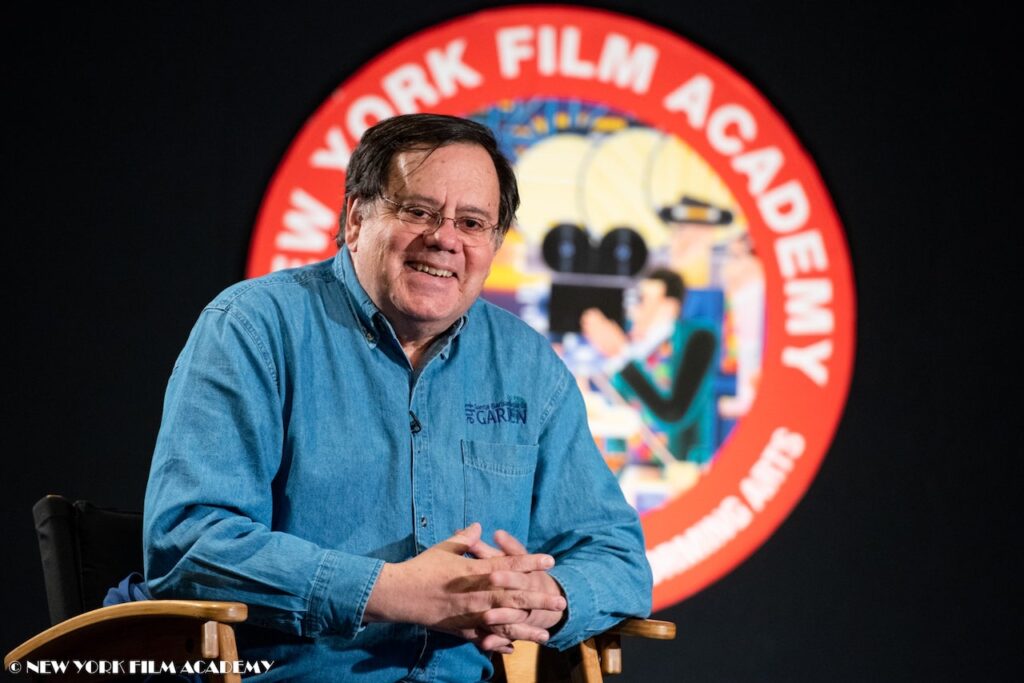On Friday, December 7, New York Film Academy (NYFA) hosted a guest lecture by Peter Rainer, noted Christian Science Monitor film critic, Bloomberg News columnist, and reviewer for National Public Radio’s FilmWeek. Peter Rainer, a NYFA Master Faculty member, is film critic for the Christian Science Monitor and NPR, author of “Rainer on Film,” and a finalist for the Pulitzer Prize in Criticism.
Rainer began by sharing the origin of his interest in movies. When he was a boy, there were not very many movies on television; because of this, he would re-watch the same movies over and over again when they aired, and doing this caused him to examine and question various elements of the films.
Once he was older, he started attending screenings of classic movies at revival theaters in New York City and reading film history books and articles by critics. He was inspired by the work of critic James Agee, who he felt elevated film criticism to art by writing with passion and style and not just listing the pros and cons of films.
“It made me think for the first time that maybe, you know, I could write about movies and be a real writer… and not just a recounter or a reviewer,” said Rainer. Rainer added that Pauline Kael was another film critic that influenced him; her style was “acerbic” and “opinionated” but distinct from other critics of her time because she was unafraid to ruffle Hollywood’s feathers.

When Rainer attended Brandeis University, he wrote movie reviews for their newspaper, The Brandeis Hoot; in Rainer’s opinion, the late 1960s to early 1970s — when he attended college — were the “Golden Age of American cinema.” During this time, Rainer had the opportunity to review classic films like A Clockwork Orange (1971), The Godfather (1972) and Cabaret (1972), and he built a portfolio of work that he later used to try to get jobs as a professional writer.
Eventually, Rainer got a job as a film critic for Mademoiselle magazine, but it was not enough to support him financially. He co-wrote a screenplay and it was produced as a film called Joyride (1977) starring Desi Arnaz, Jr. and Melanie Griffith, but Rainer’s heart was still in film criticism more than filmmaking. “I still had this jones to be a critic.” said Rainer.
Rainer then went on to work for the daily newspaper, The Los Angeles Herald Examiner, where he worked for 10 years as chief critic. When The Herald Examiner ceased publication, Rainer was hired as a film critic for the Los Angeles Times. He struggled at the Times because their editors were hesitant to criticize films made by big Hollywood production companies — they didn’t want to lose the companies’ advertising money. Rainer was frustrated with the Times’ priorities and ultimately moved on to other publications, eventually landing at the Christian Science Monitor, at which he has worked for 13 years. Additionally, he is a reviewer for National Public Radio.
Rainer shared that, as movies are increasingly distributed through digital streaming networks like Netflix, the experience of a film critic has evolved; now critics are expected to watch and review more and more movies at a time and more and more movies in a digital streaming format rather than at a theater. Rainer feels that this infringes on the critic’s — and ultimately the moviegoer’s — experience because it reduces one’s ability to be absorbed into the world of the film. Additionally, some films have special effects and production design that is better showcased on a big screen.
Rainer inquired about the students in the audience and their filmmaking aspirations. “I think in the end, filmmaking, acting, writing, producing is the same thing as what I do,” said Rainer, “in the sense that you have to sort of find who you are and work out of your own experience.” Rainer emphasized the importance of authenticity in the art of moviemaking but, he added, “I don’t know if it’s that simple.”
Ultimately, a film’s quality is based on a balance between a basic knowledge of the process and history of filmmaking and how well the story is conveyed by the actors and production team. A film critique’s quality is based on that film knowledge as well as a clear point-of-view about the movie being reviewed. Additionally, Rainer added that serious criticism is about dissecting the various aspects of a film and whether or not they conveyed the story and tone in a clear way, rather than just sharing opinions for the sake of sharing opinions — an activity heavily encouraged by the rise of internet culture.
The New York Film Academy would like to thank film critic Peter Rainer for discussing lessons learned throughout his career, and for his advice for young filmmakers from a critic’s perspective.